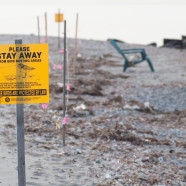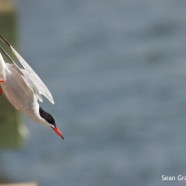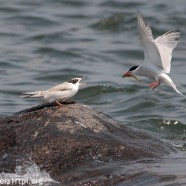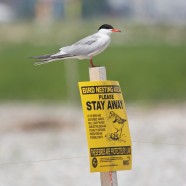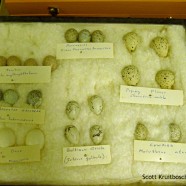Connecticut volunteers needed: fencing and signage removal
We now have three fencing removal dates set by CT DEEP to take down signage, stakes and string fencing placed on Connecticut beaches for the protection of of nesting coastal waterbirds and education of the public during the spring and summer. Breeding season is winding down and our Piping Plovers, Least Terns, American Oystercatchers and Common Terns have nearly all fledged and started to head south. We at the Audubon Alliance for Coastal Waterbirds would appreciate any volunteers who could help us out at these locations and times: Monday, August 18th at 10:30AM – Long Beach in...
Read MoreCommon Tern diving
Take a look at these shots by Sean of a Common Tern in a dive before smashing into the water to grab at prey – spectacular!
Read MoreCommon Terns feeding young
We are getting to the hungry season with young birds of all sorts begging for food from their busy and tired parents. You have probably seen this happening in your yard for a couple of months. We are now into the season for waterbirds like the Common Tern (Sterna hirundo) to be doing the same. Check out this video of a juvenile Common Tern begging for more even after an adult delivers a sizable meal! The squeaky wheel, it turns out, does indeed get the grease. Or the fish. Here are some photos of the foraging and feeding in action. That hungry little one was unhappy and then happy rather...
Read MoreCommon Tern (Sterna hirundo)
Sean found this Common Tern (Sterna hirundo) hard at work conducting beach stewardship and outreach on its own yesterday.
Read MoreEggs from the archives
There are dozens of pairs of Piping Plovers and American Oystercatchers currently with nests or young hatchlings across the Connecticut coast. We are working seven days a week as a partner in the Audubon Alliance for Coastal Waterbirds to provide stewardship and survey efforts for these birds with seasonal staff members, Audubon Connecticut staff and our tremendous volunteers, numbering well over 100 dedicated people. Least and Common Terns are also beginning to nest, a bit later than usual this year likely because of low prey populations (and maybe cooler water because of the extremely cold...
Read More



